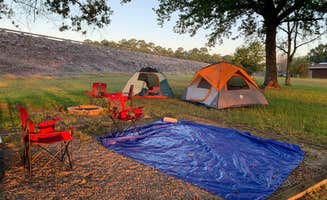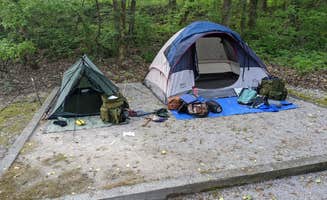Tent camping near Horn Lake, Mississippi generally features primitive sites with basic amenities within 30-45 minutes of town. Several campgrounds provide access to lakes including Arkabutla and Sardis, offering water recreation opportunities during warmer months. Summer temperatures can reach above 90°F with high humidity, while winter nights often drop to the 30s, making seasonal preparation essential for comfort.
What to do
Fishing access points: The boat ramp at Kellys Crossing Campground provides direct access to Arkabutla Lake, making it popular with anglers. "This is an off the beaten path area for standard recreation. It's technically a boat ramp that accesses Arkabutla Lake with picnic and camping areas nearby," notes Heath T.
Hiking opportunities: Tent campers can explore nearby trail systems when staying at Maple Flat Group Campground. "We did a bit of hiking at the park which was nice as well. It was a great place to spend a night," shares Sara S. The campground features large trees and mossy areas worth exploring.
Canoeing inlets: Paddlers will find numerous coves and waterways to explore from lakeside camps. "The lake has a lot of inlets to explore by canoe," mentions Kim B. about Mississippi River Park near Maple Flat. Most water access points are undeveloped, requiring campers to bring their own watercraft.
What campers like
Solitude at primitive sites: Most tent areas see limited traffic, especially on weekdays. "This is a very small campground with about 5 spots," writes Steve G. about Graham Lake, adding "it is a free campground so what can you say. It's rather nice there." Many campers appreciate the quiet atmosphere.
Waterfront views: Lakeside camping provides scenic vistas as a major draw. "The view and proximity to the water is truly what makes this spot," reports McKinley L. about Beach Point - Sardis Lake. Sites here offer direct views of the water, particularly valuable at sunrise and sunset.
Budget-friendly options: Many primitive sites around Horn Lake have minimal or no fees. Cox Lake provides basic tent camping with few amenities but at accessible pricing. "If you're looking for a place to pitch your tent for a night this is a good pick," notes Kelly C., though she cautions about litter in some areas.
What you should know
Site maintenance varies: Several campgrounds show signs of neglect or inconsistent upkeep. "The campsites are overgrown or sunken. Looks like no one has camped here or taken care of the property in years," reports Shana D. about Pleasant Hill Campground. Calling ahead to check current conditions is advisable.
Limited availability: Some sites operate seasonally or close unexpectedly. "We have camped here once, but most of the time it is closed. I am not sure why," mentions Steve G. about Elmers Hill. Always have backup options when planning tent camping in this region.
Bathroom facilities: Most campgrounds offer basic toilet facilities, though quality varies. "Bathrooms are there but bring your own paper," advises Steve G. about Graham Lake. Several sites feature vault toilets or simple structures with minimal maintenance.
Tips for camping with families
Insect protection: Mosquitoes are prevalent, especially near water and during warmer months. "Mosquitoes were bad other than that it was great," reports Hook C. about Delta Heritage Trail State Park Campground. Pack sufficient repellent and consider mosquito nets for sleeping areas.
Site selection: Choose locations with adequate space between camping areas for privacy. "Our lots were large," mentions Elizabeth S. about Beach Point, noting that the distance between sites provides a better experience for families with children or pets.
Pack extra supplies: Many campgrounds lack reliable drinking water sources. "No hookups of any kind for campers," notes Steve G. about Elmers Hill. While some sites advertise water availability, bringing containers with potable water ensures you won't be caught without this essential resource.
Tips from RVers
Access limitations: Most tent campgrounds near Horn Lake have restricted access for larger vehicles. "The roads in are horrible," warns Steve G. about Hays Crossing. Small travel trailers may access some sites, but most areas are best suited for tents or small vans.
No hookup availability: RVers should prepare for dry camping at most sites. "No hookups. Nothing," emphasizes Steve G. about Graham Lake. Generator policies vary by location, so check regulations before arrival if power is needed for equipment.
Parking restrictions: Several campgrounds require vehicles to remain in designated areas rather than at individual sites. "Cars stay in the parking lot, and you walk up to your site," explains Caitlyn E. about Beach Point. This arrangement requires planning for gear transport from parking areas to tent sites.



